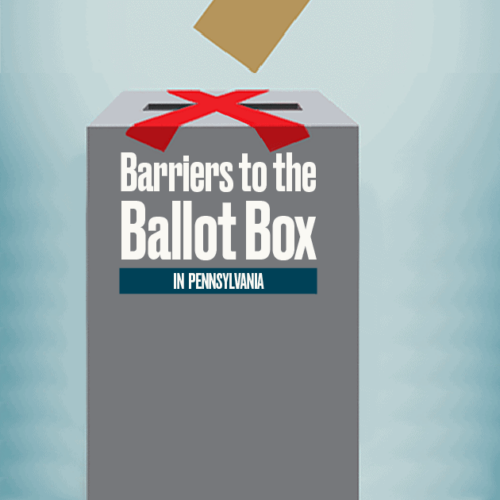Introduction
Battles over how Pennsylvanians can vote this fall are playing out down to the wire. That’s made for a bewildering election process and increased the possibility that some votes won’t get counted.
“We’re seeing general voter confusion about what their options are and what they need to do to vote, either by mail or in person,” said Suzanne Almeida, interim executive director of Common Cause Pennsylvania.
Here’s a look at some of the most significant updates on restrictions to voting rights and access in the state:
Mail-in ballots and drop boxes
A 2019 law removed the requirement to have an excuse in order to get a mail-in ballot, a change that now gives residents a way to avoid potential coronavirus exposure in Election Day polling-place lines.
Sign up for The Moment newsletter
Our CEO Susan Smith Richardson guides you through conversations and context on race and inequality.
But Pennsylvania is not among the states automatically sending absentee ballots to voters this year. That’s meant voluminous numbers of applications that have overloaded some local elections offices. Seven days before the June primary, Pennsylvania’s Delaware County was still processing 6,000 mail-in ballot applications, a problem for voters who planned on mailing them back.
Some counties provide absentee ballot drop boxes as an alternative, an increasingly common practice nationwide. The Trump campaign sued to eliminate them in this swing state, one of several ways that voting options in Pennsylvania could change late in the process.
A federal judge stayed that lawsuit while Pennsylvania’s Supreme Court was hearing a related case filed by the state Democratic Party, which wanted to keep drop boxes legal. The court’s ruling in September allows the use of drop boxes.
But the federal judge hearing the Trump campaign case will still need to weigh in. Hearings are scheduled for mid-October.
Deadlines
The state has historically required that absentee ballots arrive by Election Day evening. The Philadelphia Inquirer reported in August that some residents in the Philadelphia area waited weeks for important letters and packages amid a nationwide slowdown in mail delivery, raising concerns about delays in delivering ballots that would disenfranchise voters.
In September, the state Supreme Court ruled that ballots must be postmarked by Election Day, but they can arrive as late as 5 p.m. three days afterward. Pennsylvania’s top Republican leaders have asked the U.S. Supreme Court to stay that decision.
Naked ballots
Pennsylvania residents voting absentee must put their ballot in an inner “secrecy” envelope before dropping it into an outer envelope for mailing. What happens to the so-called “naked ballots” accidentally sent without that inner envelope?
The state Democratic Party and Trump campaign’s lawsuits both asked for a ruling, the former wanting the ballots counted and the latter wanting them tossed. The state Supreme Court’s decision: Naked ballots won’t count. One local election commissioner said that could swing the election.
On the other hand, the state told counties in mid-September that they can’t invalidate a ballot simply because a voter’s signature doesn’t look just like the one on file. Pennsylvania changed course after voting-rights groups filed a lawsuit.
The Trump campaign is now suing over that decision, too.
The legislature’s move
The Republican-controlled state legislature is considering a bill with measures that include eliminating drop boxes, giving voters eight fewer days in which to request a mail-in ballot and allowing candidates and political parties to appoint anyone in the state to be poll-watchers — people who monitor elections on their behalf and can challenge voters’ right to cast a ballot. State law currently requires that poll-watchers operate in their home counties.
There’s a voter-access argument for an earlier ballot-request deadline: County election officials are concerned about having enough time to process applications. But it’s late in the election season to be shifting a deadline that affects voters, the ACLU of Pennsylvania says.
And the proposed change in qualified poll-watchers, something the Trump campaign also asked for in its lawsuit, worries voter-access advocates.
“There’s a lot of ways that can go sideways, to have out-of-county people,” said Sara Mullen, advocacy and policy director for the American Civil Liberties Union of Pennsylvania. In the state, “only certain places have large Black populations, and other places have none, pretty much. We just think it leaves it ripe for voter suppression.”
The state House passed the bill, and the Senate is weighing it. Gov. Tom Wolf, a Democrat, has said he would veto the measure.
He has no veto power over resolutions, though, and the House is considering one that would create a Select Committee on Election Integrity to “investigate, review and make recommendations concerning the regulation and conduct of the 2020 general election.” The panel of three Republicans and two Democrats, all named by the speaker of the House, would have subpoena power.
Almeida is among those calling it a troubling proposal. It would go beyond Pennsylvania’s normal mechanisms for reviewing election processes, she said.
“It could be another plank in the broad campaign to sow distrust in election results that we’re seeing from the top down,” she said.
A vote on the resolution, scheduled yesterday, was delayed after a Republican legislator tested positive for the coronavirus.
Read more in Money and Democracy
US Polling Places
In California, language and polling place changes create voting obstacles
Voting Rights Act compliance inconsistent as state considers ballot measure expanding parolee rights.


Join the conversation
Show Comments